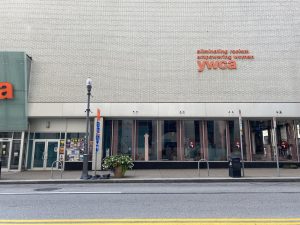Point Park professor premiers doc
October 16, 2018
A new documentary produced by a Point Park professor gave an early screening at the Center for Media Innovation Wednesday, an hour before its premiere on WQED. The thirty-minute documentary, “Downstream,” aimed to uncover threats and imperfections within the water systems in Pennsylvania. Gina Catanzarite, producer of the film and adjunct school of communication professor at Point Park, began the showing with some comments concerning the need for more transparent and fact-based journalism, and especially concerning the field of climate change.
“We live in a dangerous age of science deniers,” Catanzarite said. “Every person in here can do what we did to make this, to help people understand and learn about credible science information.”
The movie, funded by a grant from the Heinz Endowments, touched on issues facing the water systems central to Pittsburgh, including abandoned mine drainage, where old mines fill up with water during floods and contaminate nearby water sources with lead, arsenic, mercury and selenium. Another issue presented in the documentary is the sewer system in Pittsburgh, which overflows whenever the city receives more than one-tenth of an inch of rain. Because of these problems, of the 83,000 miles of rivers and streams in Pennsylvania, more than 4,000 miles of those Pennsylvania waters are dead.
Marc Edwards, the man behind the study that revealed the high amounts of lead in the waters of Flint, Michigan, made an appearance in the documentary. Edwards discussed a different problem in Pittsburgh’s water system: the antiquated lead pipes that were installed in public and private water systems decades ago. The documentary cited documents from the Center for Disease Control that half of all the children tested in Allegheny County neighborhoods showed high levels of lead. Most of these neighborhoods affected by the lead problems were low-income neighborhoods.
The showing was followed by a panel, where both a moderator and audience members directed questions towards those involved with the production. With this, behind the scenes photography was shown, and elaboration was made on what it was like to actually make the documentary.
The production members on the panel consisted of 11-time Emmy award winning Catanzarite and Zak Boyle, a 2015 Cinema Production graduate from Point Park and digital content producer at WQED. Also included were Sean Brady, president of the Three Rivers Water Keepers Board and executive director of Hollow Oak Land Trust and Anthony Gaglierd, Point Park professor in the Natural Sciences, Engineering, and Technology Department and winner of the Rachel Carson award.
Pittsburgh’s rivers are no stranger to environmental problems. Sean Brady cited that it would be estimated to take two- to three-billion dollars to fix Pittsburgh’s sewage problems. Brady, who has seen some of these changes over the years, highlighted the current situation, and expressed how important it is for the rivers to stay this way.
“As we move forward, it’s really important not to see the rivers go backwards,”
Brady said.
The experts gave their own views on what they believed were the most significant problems plaguing the local water systems. For Gaglierd, it was water draining from the land.
“Our biggest problem is urban runoff,” Gaglierd said.Brady felt that while natural gas may be a growing industry, it is incredibly dangerous for local environments.
“There is no bigger risk than Marcellus Shale drilling,” Brady said. “The things they use to drill are incredibly toxic. The things they’re bringing back up from the earth are incredibly toxic. They’re not held accountable.”
A running theme in the documentary-centered discussion was the purpose and foundation on which the project itself was made, which was informational journalism and how important it is.
Catanzarite noted this documentary was created in order to bring attention to local problems that viewers may not know about and to help them become aware, which she explains is the basis of journalism. Catanzarite also distinguished that as long as copious research is done on a topic and a platform exists to share it, journalism can
be done.
“The only difference between you and us is that we have maybe some more experience than you guys,” Catanzarite said. “ When you gather and authenticate and spread credible information to the masses, you are committing an act of journalism.”
As the discussion panel wound down, Brady took the time to share one last message with the audience.
“Vote. Get your friends to vote. Make time. […] It’s as simple as that. Make a difference,” Brady said.
Catanzarite expanded upon this, explaining that it wasn’t just important to vote, but to inform others.
“…Inform other people in responsible, accurate, clear ways so they know what they’re voting on too, and they know what’s at stake,”
Catanzarite said.
“Downstream” is currently available to view on WQED’s website.


















